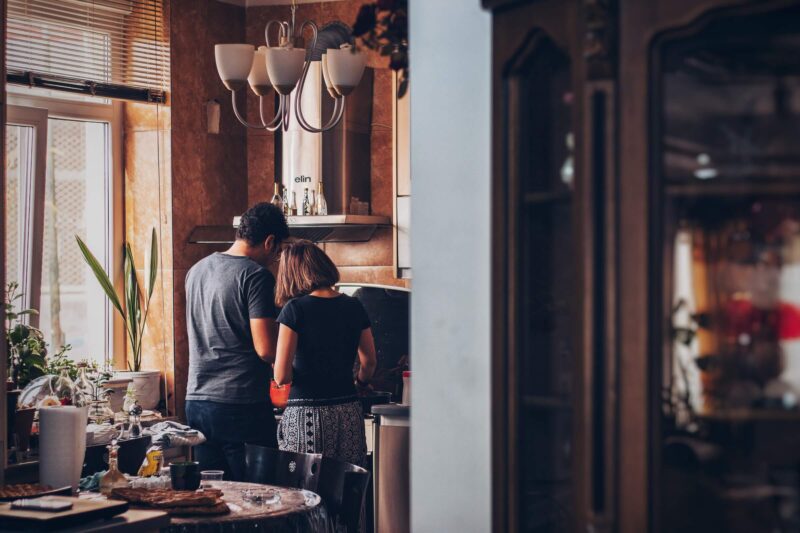Homebuying Tips for Newlyweds 
They said yes. Then, a few months – or years – down the line, you tie the knot. You have been pronounced, and in a good way too.
Home Emergency Insurance for £130
- ✓ Covered up to £1,000 per emergency
- ✓ £250 for overnight accomodation
- ✓ Call out, labour & parts included
Most people assume that a little raging terror running around and causing havoc is the next logical step. But, for many, it’s buying a home together.
Things aren’t quite like the old days when a couple would live separately with their parents until they got married. Today, it’s far more common for partners to live with each other before they get hitched. However, most who do the whole co-living thing tend to rent their home first.
Once the “I do’s” have been said, many newlyweds look to purchase their first home together. It’s safe to assume they might not know about the ins and outs of buying as a couple.
If you recently got married, first of all, congratulations! Our wedding gift to you is this comprehensive guide for newlyweds looking to buy their first home together.

Double trouble
Buying a home as a single person means plenty of paperwork and documents, especially if you need a mortgage.
You will both need to provide all of the required legal documents, and lenders will perform two separate credit checks. One person having bad credit could potentially scupper a mortgage application, which is why it’s best to check things like credit scores before going ahead with buying a home.
Do you have any debt, and are you able to pay some of it off? What is your repayment history like? These are the questions you should ask yourself before applying for a mortgage on the property you want to purchase. Preparation is the key in order to avert any nasty surprises.
Take advantage of ISAs
If you and your spouse are first-time buyers, we’ve got some good news for you. Help to Buy ISAs are government schemes designed to assist people with getting on the property ladder. There are several schemes available, each with different benefits.
Some come with no interest for the first five years, while others let you purchase a home with a five percent deposit. Newlyweds starting out can benefit from one of these schemes, especially if they are combining previous savings.
Sell to buy
Lot’s of people getting married already own a property and look to sell once they’re married. These properties are usually one-bedroom flats which have been purchased as the owner’s first steps onto the property ladder – yet they aren’t sufficient for a couple with long-term plans.
When you’re planning on spending your life together, there’s not much point in owning two smaller properties if the funds they generate can go towards a bigger home. There are tax reasons too: capital gains tax could rear its head if not navigated successfully.
Married couples can only have one qualifying property between them. However, as long as both parties lived in their respective homes prior to the marriage – and can prove they did – there shouldn’t be any capital gains tax to pay. An ideal scenario would be to sell both homes within 18 months of getting married to avoid any capital gains complications
Property type
Now the particulars are out of the way, it’s time to decide on the type of property where you want to move. Buying a house is a long-term investment, which means you need to think about more than your immediate needs.
If you’re planning to have children in the near future, you’ll likely want somewhere that is spacious and has some outside space. Larger houses are, of course, more expensive. You might need to think about an area on the outskirts of a city or town centre if square footage is driving your decisions.
Then there are other aspects to figure out, such as the house type, number of bathrooms, bedrooms, etc. Partnerships involve plenty of compromises, and being able to find common ground on a purchase as big as a home shows that you’re off to a good start.

Locals postcodes
The area where you’re going to live goes hand-in-hand with the type of property you want to buy. There are many factors to take in, such as commute times to jobs, planning for the future (is the neighbourhood child-friendly?) and what kind of life you want.
Newlyweds who want to live close to shops, restaurants and transport are likely to desire city and town centre living. Those who want something on the peaceful side, with options such as green spaces and places to go for scenic walks, will likely pick a more rural area in the countryside.
Your postcode impacts the price of a property, and the general rule of thumb says the closer you live to a city/town centre, the higher the price of a property. Deciding on the area may also need some comprise unless you are both dead set on one specific postcode.
Budget
The type of property and area where you live will be affected by your budget. Getting married isn’t exactly cheap, so it may be that your coffers aren’t as full as you’d like. On the other hand, you might have a nest egg saved – combining your savings to create a healthy deposit.
Avoid stretching beyond your means. This is your first home together, so there’s no need to go all out. Everyone wants their dream house, but you have time to build together and achieve the ultimate abode in the future. Get off on the right foot and stay in budget.
Don’t rush
Buying a home together is a big step, and you should be cautious. However, that doesn’t mean you can’t also be excited – this is a big moment for you and your spouse. Take your time and find a home that’s right for both of you. By not jumping into anything without careful consideration, you are minimising the potential of relationship strains in the future and increasing the chances of building for something special and long-lasting.